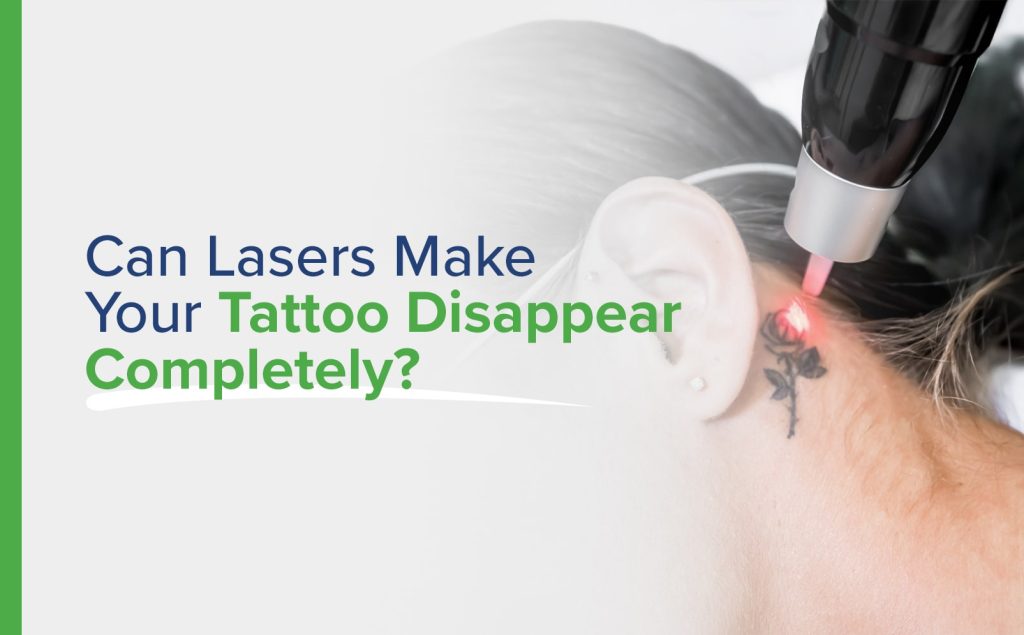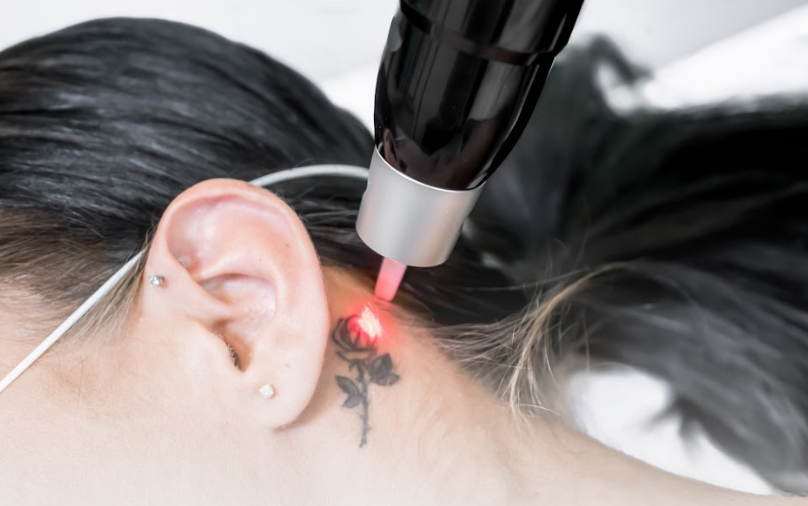
Whatever the reason for deciding to get rid of a tattoo, laser removal can help people diminish the appearance of their tattoos and start over. You can learn more below about how laser tattoo removal works and how effective the treatment is at removing tattoos below.
How Do Lasers Remove a Tattoo?
Laser tattoo removal works by targeting the pigment in the tattoo and breaking it up with a high-intensity light beam. Some colors are easier to treat than others, such as black, since the dark color absorbs the wavelengths from the laser and can be broken up more easily. Brighter colors will reflect more of the laser beam, so you’ll need more treatments for light-colored tattoos than dark tattoos.
You should first schedule a consultation with a professional who can look at your tattoo and determine how the process will go. A professional can guide you through the full tattoo removal process to help you better understand what to expect from treatment.
During the treatment, you can expect the following:
- The technician will provide you with a pair of protective eye shields before starting the laser treatment.
- The technician will test the laser on your skin, looking for any reactions and the best way forward with treatment.
- The technician will move the laser across the top layers of skin, which the tattoo pigment will absorb. As the laser beam is absorbed, it’ll break up the ink pigment.
It’s also important to note that treatment won’t affect the surrounding skin. Only the tattoo pigment absorbs the laser, and it’s broken up into such small pieces that your lymphatic system can easily flush them away.
Can a Tattoo Be Completely Removed?
Laser treatment could fully remove a tattoo, but it may take a few treatments. The number of treatments you need to completely remove your tattoo will depend on various factors, such as the color, size and density of your tattoo.
During your consultation, a professional can determine what will work for your situation. They’ll estimate how many treatments you may need to remove your tattoo. After your first treatment, you should see significant improvement as your lymphatic system works to clear away the broken-up pigment.

6 Factors That Impact the Success of Your Tattoo Removal
Different factors affect how effectively and quickly a technician can remove your tattoo. In most cases, these factors only slow the process, not make it impossible. Here are the different factors that can affect the success of your removal:
1. Tattoo Color
Tattoos with light or multiple colors can be more challenging to treat than all-black tattoos. Different colors sit in different layers of your skin, so technicians must use more precision to eliminate the pigment from your skin.
A qualified and experienced technician can remove all colors, but remember that varying combinations of pigments and light pigments will take more time than an all-black tattoo.
2. Tattoo Size
Having larger tattoos, such as an entire arm sleeve, affects your body’s circulation, which becomes less prominent at the top of the skin. As a result, large tattoos can be more challenging to remove. Still, you can remove them — they just take more time.
3. Tattoo Age
Older tattoos often look faded. This is because our bodies break down the ink over time, meaning older tattoos can be easier to remove via laser. As a general rule, newer tattoos will take longer to remove, and older ones will be easier to remove. Still, this all depends on how your body processes your tattoo in the first place.
4. Skin Tone
In some cases, darker skin tones can make tattoos harder to remove. This is because dark skin absorbs more of the laser beam’s energy than light skin, which can affect how effective the treatment is. As a result, people with dark skin often require more treatments to achieve the desired result.
5. Smoking
Smoking after your treatment can affect your recovery. Research shows that smoking impacts the body’s healing process. A person who smokes might need more treatments, especially if their healing process is affected during recovery.
6. Post-Treatment Care
Failing to take care of the treated area after laser removal can also impact your treatment’s success. If you don’t keep the area dry, clean or blocked from sunlight while healing, it can increase your risk of infection, affecting the treated area’s appearance.
How Many Sessions Will It Take to Remove Your Tattoo Completely?
The number of sessions you’ll need to remove your tattoo depends on the above factors. Your tattoo’s age, size and color will be the aspects your technician uses to determine how many treatments you need. Some people will start to notice significant differences after a single session, while others won’t see a change until they’ve gone through a couple of sessions.
During the consultation stage, your technician should be able to estimate how many sessions you need. However, some people’s skin responds better to treatment than others, so you may need more or less than initially estimated once you begin treatment.
The Effectiveness of Picolazer Technology for Tattoo Removal
FDA-approved Picolazer technology is effective at removing tattoos quickly. Some people can even see complete removal in as little as two sessions. Picolazer treatment works the same as other tattoo removal lasers, breaking up the pigment in the skin.
One study showed that patients experienced over 70% of tattoo removal after one to 10 treatments, depending on the size, age and color of their tattoo. Some even saw 100% tattoo removal results after their treatment. The Picolazer is a safe method of removing tattoos with minimal discomfort.
Picolazer technology is excellent for individuals looking for a more comfortable tattoo removal process with lasting results. The technology can treat tattoos of any size, color or location, helping remove unwanted tattoos while protecting your skin from damage.
Trust Synergy Wellness as Your Tattoo Removal Experts
While tattoos are an excellent way to express yourself, not everyone is pleased with them years later. Some people change their minds, get bad artwork or don’t connect with their tattoos anymore. Whatever your reason is for wanting to remove your tattoo, Synergy Wellness is here to help.
We utilize Picolazer technology for our tattoo removals, ensuring you can get the best results with minimal discomfort. Our technicians will guide you through the process, helping you understand what to expect. Most patients experience little to no downtime after treatment. We recommend multiple treatments for the best results, even if you see significant change after your first treatment.
Contact us today to learn more about how we can help with tattoo removal in Bakersfield, California!




